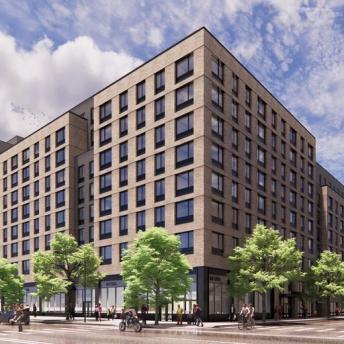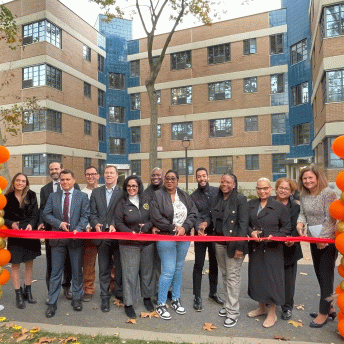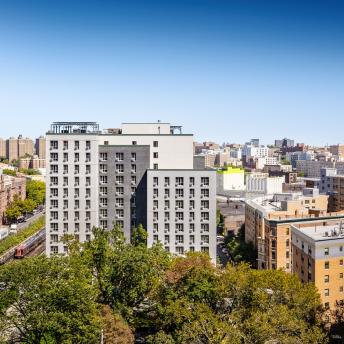New York, NY—The U.S. Department of Housing and Urban Development (HUD), the New York State Office of Temporary and Disability Assistance (OTDA), the New York City Housing Development Corporation (HDC), New York City Department of Housing Preservation and Development (HPD), the Corporation for Supportive Housing (CSH), Bank of America, Deutsche Bank, and TD Bank today joined Project Renewal at a groundbreaking ceremony to mark the start of construction on Bedford Green House in the Bedford Park section of the Bronx. The $58.8 million, 118-unit development will provide supportive and affordable housing for more than 160 residents, including families, singles, and seniors.
The project will feature a number of unique and innovative elements including a rooftop aquaponics greenhouse, a living green façade, a community playground, and custom artwork from the Bronx community. Located at 2865 Creston Avenue, the 13-story, block-and-plank building will meet or exceed LEED Gold standards for energy efficiency and environmentally friendly design.
“Healthy homes lead to healthy residents, a principle that Secretary Carson knows from experience to be true and one that will prove itself for the formerly homeless families and individuals that will call Bedford Green home. Financed in part through $2 million in HUD HOME funds, this extraordinarily designed project will nurture the minds, bodies, and spirits of its clients, helping set them on the path to economic recovery and self-sufficiency,” said Lynne Patton, HUD Regional Administrator for New York and New Jersey.
“We are proud to be contributing $6.2 million through our Homeless Housing and Assistance Program. Projects like this highlight Governor Cuomo’s ongoing commitment to increase the number of affordable and supportive housing units available in New York City and throughout the state,” said Samuel D. Roberts, Commissioner, Office of Temporary and Disability Assistance.
“A critical pillar of the Jerome Avenue Neighborhood Plan is creating sustainable, high-quality, affordable housing. The start of construction of Bedford Green House – a LEED designed supportive housing development that will provide 118 homes and a rooftop garden and vertical farm to foster healthy living – represents a significant milestone towards that commitment. Through HNY 2.0, our accelerated and expanded housing plan, we will continue to build on the policies and programs already set in motion to ensure that neighborhoods like those surrounding Jerome Avenue are anchored by affordability and opportunity for generations to come," said HPD Commissioner Maria Torres-Springer. “I want to thank Project Renewal and our many government and private partners for their creativity and hard work to advance this dynamic project for the community.”
“Bedford Green House will bring 118 low-income and formerly homeless households into safe, high-quality affordable housing, with a built-in network of critical social services and amenities. This project underscores how vital all our government, private, and non-profit resources are to creating new affordable and supportive housing,” said HDC President Eric Enderlin. “I congratulate Project Renewal and all our partners, including many agencies across federal, state and city government, for their commitments to this project and their dedication to building a more affordable New York.”
“We are thrilled to break ground on Bedford Green House, a development that will provide high-quality affordable and supportive housing for hundreds of individuals and families. Throughout our 50-year history, Project Renewal has provided innovative programs to help New Yorkers in need. We will continue to do that at Bedford Green House with comprehensive services and cutting-edge features like aquaponics to ensure that residents can lead healthy, stable lives,” said Mitchell Netburn, President & CEO Project Renewal.

The rooftop greenhouse will be filled with nutritious produce in an innovative vertical farming system called aquaponics, in which residents will raise delicious, nutritious fish and vegetables in a symbiotic ecosystem. Edible tilapia fish will live in large tanks connected to a bio-filter that breaks down fish waste and carries nutrients to the plant roots; meanwhile the plants will clean the water for the fish. Because the aquaponics growing platforms can be stacked vertically, produce yields per square foot will be many times higher than with traditional soil-based farming.
Project Renewal will use the rooftop space outside the greenhouse for organic farming in planter boxes to grow vegetables that are less suited to aquaponics. Residents will work with Project Renewal’s horticultural therapist to grow their own food in the airy and light-filled greenhouse, year-round, alongside their friends and neighbors. Horticultural therapy in the greenhouse will be especially beneficial to elderly residents who can often be isolated at home, and for residents who suffer from Seasonal Affective Disorder, which is common during winter months.
The rooftop will also feature a demonstration kitchen with healthy cooking classes for residents and community members, taught by professional chefs from Project Renewal’s Culinary Arts Training Program.
Bedford Green House’s active design was influenced by the theory of biophilia—the innately emotional affiliation of human beings to other living organisms. Scientific studies have supported biophilia, showing that exposure to the natural world reduces stress levels, shortens recovery times for hospital patients, lowers blood pressure, reduces depression, and increases insulin sensitivity among diabetics.
In light of these findings, Bedford Green House will feature an interior green wall in the lobby and an exterior living green façade at the building frontage, featuring plants and vines cascading from planters. In addition to transforming the visual character of the neighborhood, the vines will reduce the building’s energy usage by absorbing solar radiation during the hot summer months when the vines have leaves. During winter months, the vines will shed their leaves and allow solar radiation to warm the building, bringing in heat and light when it is most needed. The vines will also remove airborne pollutants, which is especially important in the Bronx where children are hospitalized by asthma at a rate that is 21 times higher than more affluent areas of New York City.
Bedford Green House will create an inviting streetscape through landscaping along the sidewalk frontage, seats at the setbacks, and public art that will encourage residents and neighbors to engage with the building. Highlighting the front yard will be a colorful community playground—with two slides, jungle gym, musical instruments, and a water fountain to play in during summer months—that will be accessible to children of families who live in the building, as well as community residents. The rear courtyard and front setbacks will also include extensive landscaping and space for yoga, group exercise, and mindfulness classes.
The project is the first phase of the Project Renewal’s larger plan to create 90 additional affordable homes through the redevelopment of a neighboring site.
Bedford Green House’s development team is led by Mitchell Netburn and Sam Wells at Project Renewal, and by Jonathan Rose and Dale White at The Jonathan Rose Companies. Hollister Construction Services is serving as the general contractor. Architectural design services are provided by Edelman Sultan Knox Wood Architects, with structural engineering by Robert Silman Associates, MEP engineering by Allen Rosenthal, geotechnical engineering by Mueser Rutledge, landscape design by Billie Cohen, Ltd., waterproofing and façade design by The Façade Group, lighting by Jim Conti, aquaponics by A&A Epiphany, LEED design by Steven Winter Associates, cost estimating by SBI Consultants, environmental consulting by The Hillmann Group, Sam Schwartz Engineering, Genesis Environmental, surveying by Montrose Surveying, title search by Chicago Title Company, and expediting by Design 2147.
Bedford Green House was financed under HDC’s Extremely Low- and Low-Income Affordability (ELLA) program and HPD’s Supportive Housing New Construction program. The total development cost for the project is over $58.8 million. HDC provided more than $28.2 million in tax-exempt volume cap bonds, $1.7 million in recycled tax-exempt bonds, and nearly $7 million in corporate reserves. HPD provided $8.85 million in City subsidy, inclusive of $2 million in HOME funds. HPD also provided an allocation of annual Low-Income Housing Tax Credits (LIHTC), which generated nearly $24 million in tax credit equity. Bank of America served as tax credit investor and provided the construction letter of credit. NYS OTDA provided $6.22 million under the Homeless Housing and Assistance Program (HHAP). Additional grant funding was provided TD Bank and Deutsche Bank Foundation.
"Project Renewal is an exceptional partner committed to solving the homelessness crisis here in New York City. CSH is investing $5.3 million in loans in Bedford Green Phases 1 & 2 because these new affordable, supportive housing units will go a long way toward providing real homes to New Yorkers who have struggled through homelessness on our streets," said Jennifer Trepinski, Director of Loan Originations, CSH.
“In addition to delivering much needed affordable and supportive housing options to the residents of the Bronx, Bedford Green House brings innovative, sustainable design elements that will advance healthy living in the Bedford Park neighborhood. Bank of America Merrill Lynch is excited to have provided over $54MM of debt and equity investments to support Project Renewal’s vision for transforming lives in the communities that it serves,” said Todd A. Gomez, Market Executive - North Region, Bank of America Merrill Lynch.
“Deutsche Bank is proud to support Project Renewal in the development of the Bedford Green House. This will provide critically needed affordable and supportive homes to hundreds of residents, many of whom have experienced homelessness, as well as facilities shared with the local community. Bedford Green House will be a true asset to the neighborhood and city,” said John Kimble, Vice President / Philanthropic Initiatives, Deutsche Bank.
“Architecture at its most fundamental is an expression of societies’ aspirations. In that context Bedford Green House is a statement that we take care of the people of our community who are disadvantaged. These individuals are deserving of an exceptional building that has the capacity to make their lives better, through the choice of layout, materials, amenities, and greenhouse for teaching healthy living. And we extend that aspiration into the community, making a building with a neighborhood play area, a 24-hour doorman watching the street, green infrastructure that will help clean the air and brighten lives, and by leaving exposed the bedrock of the site, which is the history of the Bronx. In this way the building contributes to the neighborhood, making it greener, healthier, and more connected. Bedford Green House is an embodiment of the best that New York City, New York State and the Bronx has to offer its community,” said Andrew B. Knox, Partner, Edelman Sultan Knox Wood / Architects LLP.
“Hollister is very proud to be part of this team bringing to life such a unique building in the Bronx. Knowing that this facility will change the lives of many people makes the project even more special. Since our inception, we’ve made a constant effort to involve ourselves with projects that benefit and transform communities and Bedford Green House is a great example. We are all looking forward to seeing many happy faces when the facility makes its grand opening,” said Christopher Johnson, CEO, Hollister.
###
About Project Renewal
Project Renewal is a New York City-based nonprofit organization that works to end the cycle of homelessness by empowering adults and children to renew their lives with health, homes and jobs. Project Renewal’s innovative programs are designed to end the revolving door of emergency rooms, jails, shelters and the streets. For 50 years, Project Renewal’s pioneering approach has created uniquely integrated and comprehensive programs that are replicated around the nation, helping even beyond the 16,000 homeless New Yorkers Project Renewal serves every year. www.projectrenewal.org
About the New York City Department of Housing Preservation and Development (HPD)
The New York City Department of Housing Preservation and Development (HPD) is the nation’s largest municipal housing preservation and development agency. Its mission is to promote quality housing and diverse, thriving neighborhoods for New Yorkers through loan and development programs for new affordable housing, preservation of the affordability of the existing housing stock, enforcement of housing quality standards, and educational programs for tenants and building owners. HPD is tasked with fulfilling Mayor de Blasio’s Housing New York Plan which was recently upgraded to Housing New York 2.0. The enhanced plan introduces a suite of initiatives that will help create 200,000 affordable homes two years ahead of the original schedule, by 2022, and reach a new goal of 300,000 homes by 2026. For full details visit www.nyc.gov/hpd and for regular updates on HPD news and services, connect with us on Facebook, Twitter, and Instagram @NYCHousing.
About New York City Housing Development Corporation (HDC)
In 1971, the New York State Legislature created the New York City Housing Development Corporation (HDC) as a supplementary and alternative means of supplying financing for affordable housing that was independent from the City's capital budget. The flexibility built into HDC’s authorizing statute allows it to amend its programs and goals in response to the changing economic climate. As a result, HDC has become the leading local housing finance agency in the nation, outperforming many of the nation’s largest banks in the volume and dollar amount of bonds issued. Since 2014, HDC has leveraged more than $4.5 billion in bond financing and devoted more than $480 million in direct subsidy from its corporate reserves to support Mayor de Blasio’s housing plan.



